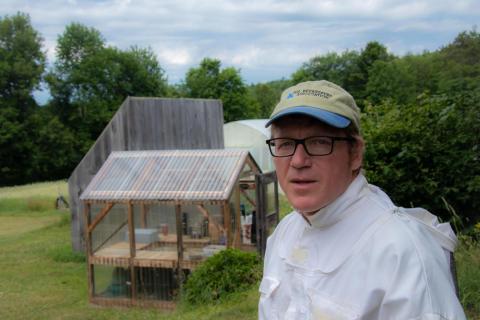The Buzz About McCormack’s Farm

Farming is rewarding, but as most agricultural producers know, the work is challenging. This is especially true for new farmers. Earlier this year, UNH Extension interviewed beginning Granite State farmers. In this continuing series of profiles, we share their success stories, challenges, farming tips and hopes for the future of their businesses.
When Jeff McCormack opened McCormack’s Farm in Gilmanton in 2013, it was a lot like other Granite State farms: a diverse assortment of crops and livestock along with a little logging and some bees. It wasn’t long before McCormack realized that his hives and hand-made beekeeping supplies were attracting some serious buzz. Now, bees are McCormack’s focus—in fact, the farm’s motto is “Keeping bees in the rugged Northeast.”
“I’ve been kind of changing course since I started,” he says. “I focus more on the bees now, obviously, but I think I could even narrow it down to a more niche market.”
McCormack’s Farm is an operation built from scratch. The barn out of which McCormack runs the business was built from logs cut and processed on his property. And he’s known to beekeepers across the state for his beekeeping supplies, some of which he assembles and paints by hand.
“I assemble and paint the hive components and sell them ready for use,” McCormack says.

It’s a busy, self-sufficient operation, not unlike the bees that live on the property. McCormack also breeds and raises queens for sale and for using to expand his apiary. Though bees and honey are often a sign of warmer weather, McCormack’s operation is buzzing with activity throughout the year. In the summer, his honeybees fly from their hives to surrounding blossoms, including his three fields, thick with flowers like buckwheat and other flowering plants and produce wildflower honey. As the weather grows colder and the bees form a cluster within the hive, McCormack attends beekeeping workshops and club meetings where he sells his bees and equipment in preparation for the spring.
“I go to a lot of the bee clubs and try to learn as much as I can from other beekeepers,” he says.
New Hampshire’s beekeeping community is closely-knit, and it’s one of the aspects of raising bees that McCormack most enjoys. He’s a member of the Winnipesaukee Beekeepers Association, as well as part of UNH Extension’s NH Honey Bee Diagnostic Network, a group of dedicated volunteers who have been trained how to analyze honey bees for infections of Nosema, a disease that can contribute to colony losses.
McCormack works the farm full-time and his wife handles the bookkeeping, in addition to another full-time job. The farm is growing, and while that growth is good, McCormack, like most farmers, knows it can also stretch resources thin. Knowing the right time to hire extra help is question many new farmers face.
“I’m spread kind of thin with the bee supplies, rearing queens, pollination, raising bees for sale,” he says. “I think to keep on that trajectory is going to require some help.”

